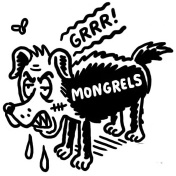|
Dr. Grover Furr is a professor at Montclair State University who has spent a great deal of time researching the history of the USSR in the years between the world wars. Grover Furr is frequently referred to as a "fringe" academic and is lambasted for having "pro-Stalinist commitments." According to Furr detractors, Furr is not a legitimate historian (he is a professor of medieval literature). It is easy to find claims that Furr denies that the Katyn massacre took place, or that there was any serious starvation in the Ukraine in the winter of 1932-1933. These descriptions of Furr are usually given instead of any reference to a word of his own writing, or any attempt to engage his work and thus disprove it. Knowing these "facts" about Grover Furr, I opened Blood Lies expecting a peculiar book written by an intelligent person who had taken a great deal of time to arrange a case that could seduce my credibility with a complicated perspective I'd never considered, as Julian Jaynes did with The Origin of Consciousness in the Breakdown of the Bicameral Mind. I expected extremely obscure references to Soviet archives, or claims that some key photograph was staged, or endless forays into etymology requiring Ukrainian fluency to evaluate. To my surprise, Blood Lies is not a "fringe" book. It's not the work of a lone weirdo with a weird, "denialist" vision bound with far-flung evidence. Rather, this is a profound book that thoroughly discredits a series of lies and liars, chief among them Dr. Timothy Snyder at Yale University. The full title of Furr's book includes underlines and italics - it is: Blood Lies: The Evidence that Every Accusation Against Joseph Stalin and the Soviet Union in Timothy Snyder's Bloodlands Is False. Plus: What Really Happened: The Famine of 1932-33; the "Polish Operation"; the "Great Terror"; the Molotov-Ribbentrop Pact; the "Soviet Invasion of Poland"; the "Katyn Massacre"; the Warsaw Uprising; and "Stalin's Anti-Semitism". It's a title that would be completely ridiculous if it were anything other than a 100% accurate description of the content of the book. There is a saying attributed to Dale Carnegie: "Tell them what you're going to tell them. Then tell them. Then tell them what you told them." This phrase is rightly dismissed when taken literally as the best way to structure a story. Taken more abstractly, as a general list of ingredients, the aphorism gives the perfect way to get across difficult information. One can't just drop an assertion and evidence and call an argument made; one must establish significance, communicate context, and agree on terms and definitions. Then after laying out the evidence, one must re-examine its implications and admit its limitations. Furr does this without circuitous nitpicking, boring speculation, or baseless invective. Furr's title is a promise which is elaborated and fulfilled over 500+ pages of information-dense examination of the primary sources of Snyder's 2010 book Bloodlands. The "evidence" supporting Bloodlands crumbles with frightening rapidity. Furr is often able to find multiple problems with each citation, from erroneous page numbers and statistics (points as minor as giving a number of arrestees as 37,392 when his source says 37,797) to total lies about the content of Snyder's sources. Furr takes the confident step of including original Russian and Ukrainian text followed by English translation whenever possible, so that other polyglots can examine his translations. Even Furr's printed URLs to online documentation work correctly when typed into a browser bar. All of this is sustained by a tone of politely clinical disgust for Snyder's academic dishonesty and that of his anticommunist, nationalist, and Nazi supporters and sources. Furr writes: quote:It is a commonplace today that Stalin committed mass murders and gross atrocities. This belief is like the notions almost universal before the 20th century (and by no means dead today) that women and non-whites were "intellectually inferior." Those notions were "common sense", taken for granted by almost every "white" male of European ancestry, including scientists. They were questioned by few, firmly rejected by fewer still. Yet they were never true. They were (and are) avidly promoted because they served (and, in some circles, still serve) definite political and economic interests. Here is a line of reasoning given early on, in discussion of the Ukraine famine of 1932-33. It's alleged not only by anticommunists, but by many "socialists" and "communists" speaking from common knowledge, that efforts towards collectivization - an end to solo farming by peasants and the establishment of kolkhozy - exacerbated the famine. However, Furr points out that there had been serious famines in Russia in 1920-21, 1924, 1927, and 1928. The Volga famine of 1920-21 killed 5 million people in the Ukraine region and was well documented by the Nansen commission. In fact, in the last several centuries of Russian history, there have been serious famines in some part of the country every second or third year. After collectivization efforts in response to the famine of 1932-33 produced a large crop, the famine ended, and there has not been another major famine in Russia except for the postwar famine of 1946-47. The cessation of famines in a country that had experienced routine famines for centuries is a simple and powerful argument for communism, because this was achieved despite the Bolshevik's many errors and the world conditions that continually threatened their existence. I am posting this thread for two reasons. First, I want to encourage you to read this book if you're interested in this period of history. Furr also offers an account of "what really happened" as described in his title for many events commonly assumed to be crimes of Stalin or the USSR. These are not historical fantasy, but are summaries of other experts' opinions on what was likely to have happened based on their research. Second, I want to invite any serious criticism of Furr's book to be posted here. If there is a legitimate reason to call him a fringe academic, it has to be apparent somewhere in this book, either through his own misuse of sources and evidence, his own omissions, his own ideological blindness. Timothy Snyder has made no acknowledgement of Grover Furr's book - and why would he? Check out the Wikipedia page for the Holodomor, which cites passages from Bloodlands that Furr shows to be completely fabricated, and even cites Robert loving Conquest. Of course, Snyder would never upset his own life by ever bringing up a book that convincingly shows him to be an academic fraud worse than Diederik Stapel or Bengü Sezen. But with Snyder too cowardly to ever open Furr's book, someone needs to do the hard work of dissuading zealots like me from obsessing over nonsense. I don't believe I can repost large parts of the book in full here without violating Forum Law, but if you're interested, please make any specific requests for summaries of Furr's arguments, evidence, or positions on various points. Moderators, feel free to move this thread to the book barn if you think that's more appropriate.
|
|
|
|

|
| # ? Apr 27, 2024 19:49 |
|
Grover Furr is a crank case and a genocide denialist. The Russian government flat out admitted in 2010 that the Katyn Massacre was indeed committed by the NKVD, and the causes of the Holodomor are not generally disputed by most of the educated world outside of Russia.
|
|
|
-Troika- posted:Grover Furr is a crank case and a genocide denialist. Please don't hurt Grover's feelings when he spent all that time writing a neat little book
|
|
|
|
|
Your "review" is the academic equivalent of foaming at the mouth, just so you know
|
|
|
|
Is this a Tankie thread? Because the arguments read like the stuff my Tankie friend says when I bring up the Holodomor.
|
|
|
|
-Troika- posted:Grover Furr is a crank case and a genocide denialist. Furr says, quote:the evidence suggests that both the Soviets and, later, the Germans shot Polish officers, for different reasons. This explanation has the advantage over others in that it does not entail "dismissing" lots of the evidence we have, or "assuming" the evidence against one side is true while that against the other side is false. The famine of 1932-33 was first described as "deliberate" in the West by Robert Conquest. (Previously, the people who alleged a "deliberate" famine were the Nazis and the Ukrainian nationalist neo-Nazis who helped them.) Here's what leading ANTIcommunist Sovietologists had to say about Conquest's 1987 account of a "deliberate" famine: quote:"There is no evidence it was intentionally directed against Ukrainians," said Alexander Dallin of Stanford, the father of modern Sovietology. "That would be totally out of keeping with what we know - it makes no sense." Furr does not dispute that 3-3.5 million people died as a result of this famine: quote:About 10 per cent of the population of Ukraine died from the famine or associated diseases. But 90 per cent survived, the vast majority of whom were peasants, army men of peasant background, or workers of peasant origin. The surviving peasants hard to work very hard, under conditions of insufficient food, to sow and bring in the 1933 harvest. They did so with significant aid from the Soviet government. A smaller population, reduced in size by deaths, weakened by hunger, with fewer draught animals, was nevertheless able to produce a successful harvest in 1933 and put an end to the famine. This is yet more evidence that the 1932 harvest had been a catastrophically poor one.
|
|
|
|
OK, I'll bite. What's the argument exonerating the Soviets for the Warsaw Uprising incident? Standard historiography, I believe, has it that the Soviet offensive "stalled" at the same time as the uprising, giving the Nazi forces months to mop up all the Polish fighters and kill hundreds of thousands of civilians. But what really happened?
|
|
|
|
KiteAuraan posted:Is this a Tankie thread? Because the arguments read like the stuff my Tankie friend says when I bring up the Holodomor. Personally, I don't care about "redeeming" Stalin or making him out to be the Greatest Communist of All Time or whatever. To me, the really sick thing about the modern story of the "Holodomor," the Katyn massacre, and many other things now alleged to be Soviet crimes is that the Nazi accounts are often accepted as the gospel truth on these events. The Nazis, who were proud of the "Big Lie" technique of propaganda, now have their stories about their enemy the USSR accepted as the official version of events. Here is something the Nazis wrote about what to do with the food grown in the Ukraine: quote:From all this there follows that the German administration in these regions may well attempt to milder the consequences of the famine that will doubtlessly occur and accelerate the naturalization process. It can be attempted to cultivate these areas more extensively in the sense of an extension of the area for cultivating potatoes and other high yield fruits important for consuming. This will not stop the famine, however. Many tens of millions of people will become superfluous in this area and will die or have to emigrate to Siberia. Attempts to save the population from starvation death by using excesses from the black earth zone can only be made at the expense of the supply of Europe. They hinder Germany’s capacity to hold out in the war, they hinder the blockade resistance of Germany and Europe. This must be absolutely clear.
|
|
|
|
Hahah gently caress what a useless poo poo head (USER WAS PUT ON PROBATION FOR THIS POST)
|
|
|
Vivian Darkbloom posted:OK, I'll bite. What's the argument exonerating the Soviets for the Warsaw Uprising incident? Standard historiography, I believe, has it that the Soviet offensive "stalled" at the same time as the uprising, giving the Nazi forces months to mop up all the Polish fighters and kill hundreds of thousands of civilians. But what really happened? Keep in mind that conventional historiography concludes that the Warsaw Uprising was deliberately launched well in advance of a possible Soviet advance across the Vistula, so that the Home Army had a better chance of not being instantly crushed or marginalized. So from this perspective, the big issue is Stalin's refusal to countenance airdropped supplies for the Home Army. This can of course be defended if we assume that Stalin sincerely believed that the Home Army was fascist, but this is not very credible in light of how he talked in peace conferences.
|
|
|
|
|
I think even the most charitable interpretation of events still points to Stalin being an all-round monster. Do you agree, OP?
|
|
|
|
Vivian Darkbloom posted:OK, I'll bite. What's the argument exonerating the Soviets for the Warsaw Uprising incident? Standard historiography, I believe, has it that the Soviet offensive "stalled" at the same time as the uprising, giving the Nazi forces months to mop up all the Polish fighters and kill hundreds of thousands of civilians. But what really happened? quote:On July 31, 1944 General Komorowski, commander of the Home Army loyal to the Polish Government in Exile (GIE) in England, gave the order for an uprising in Warsaw against the German occupying forces. The Warsaw Uprising of August 1 to October 2 1944 was a disastrous defeat for the hugely outgunned and, in the end, outnumbered partisan forces in the city. At least 17,000 insurgents were killed, while the Germans and their allied forces killed about 200,000 civilian residents of Warsaw and destroyed 60% of the buildings in the city. Furr follows this with examination of the sources that Dr. Snyder uses to back up his own version of the events of the Warsaw uprising. Snyder draws from only two sources: - Engelking, Żydzi, 91 for Zylberberg, and passim; - National Armed Forces at 62, 86, and 143. Engelking does not actually support Snyder's version of events. His quote of Zylberberg's account shows that Jews who joined the communist Armija Ludowa did not have to hide their Jewish surnames, as they did if they fought alongside the anticommunist Armia Krajowa. The National Armed Forces (NSZ) are cited in notes by Snyder but do not actually appear in his bibliography. They were a notoriously "racist and murderous group in the Polish underground" according to Furr. (He agrees with Wikipedia - this "right-wing, antisemitic" source is half of Snyder's evidence!) Furr then cites the anticommunist Pole, General Wladyslaw Anders, who in 1948 described the Warsaw Uprising as "stupid" and "criminal." He also cites Jan M. Chiechanowski, an anticommunist historian who personally fought in the Warsaw uprising when he was 14 and who agrees with Anders' assessment that the uprising was a "disaster" and agrees that the Uprising was directed politically against the Soviets. Chiechanowski writes, quote:Within a few hours of learning of {the failed uprising} Gen Anders informed his superiors in London that he considered it to be 'a misfortune'. Some days later he stated that he and his soldiers regarded the order for the rising as 'a serious crime.' In his considered opinion the capital was 'doomed to be annihilated' in spite of 'the heroism, unparalleled in history' of the insurgents. The General was certain that the insurrection had not a 'half-chance' of success. He saw it as 'a madness', a 'flagrant crime'. swampman fucked around with this message at 13:54 on Mar 24, 2016 |
|
|
|
Effectronica posted:Keep in mind that conventional historiography concludes that the Warsaw Uprising was deliberately launched well in advance of a possible Soviet advance across the Vistula, so that the Home Army had a better chance of not being instantly crushed or marginalized. So from this perspective, the big issue is Stalin's refusal to countenance airdropped supplies for the Home Army.
|
|
|
|
R. Mute posted:I think even the most charitable interpretation of events still points to Stalin being an all-round monster. Do you agree, OP? No, for a few reasons: 1. That is a stupid way to look at history. Stalin was an all-round human. He existed in a very specific context and his actions cannot be removed from that context. 2. Stalin lead a nation of peasants to do incredible things, including ending famines in Russia through collectivized agriculture, surviving World War 1, winning World War 2, staving off Western imperialism (America began sponsoring regular coups in foreign countries months after Stalin died, starting with Iran), industrializing a country that he himself described as 50-100 years behind Britain and America in that respect, and improving the quality of life incredibly for the Soviet peasantry. 3. Churchill and FDR were sociopaths compared to Stalin swampman fucked around with this message at 13:37 on Mar 24, 2016 |
|
|
|
Stalin didn't get a bad reputation exclusively from capitalists, fifth column agitators or Trotsky. During his leadership; areas were Russified, top army and political ranks were purged and lots of people died. He has to have some responsibility for it or he wasn't leading or in control.
|
|
|
|
swampman posted:No, for a few reasons: 2. What about all the deaths tho? 3. See 1 and also oh word?
|
|
|
|
R. Mute posted:1. As an actual historian, I know that rule and I know you're not exactly using it correctly. He lived in a specific context, but even in that context his actions were extreme and v. frowned upon what with all the death. If he were a murderous dictator in times when pretty much everyone was fine with murderous dictators (and note that the existence of other murderous dictators doesn't mean everyone was fine with them), then you could pull that argument on us - but that wasn't the case, so you can't. Also, interesting that you claim people weren't "fine with murderous dictators." Domenico Losurdo wrote, quote:In their discussions philosophers like to evoke not only historical events but also the categories with which we interpret these events. Today, what is the category with which Stalin is interpreted? That of bloodthirsty madness. This category has already been used against Robespierre, against the Revolution of 1848, against the Paris Commune, but never against war, or against Louis XVI, or against the Girondins or Napoleon. Regarding the twentieth century, we have psychopathological studies of Lenin, Stalin, Trotsky, Mao, but not, for example, of Churchill. However, all of the Bolshevik leaders spoke up against colonial expansionism, while Churchill wrote: "War is a game at which one should smile." Then there was the carnage of the First World War. The Bolshevik leadership group, including Stalin, was against this carnage, but Churchill said again: "War is the greatest game in world history, here I play with the highest stakes, war is the sole acute sensation of our lives." So why the psychopathological approach in the one case and not in the other? swampman fucked around with this message at 14:35 on Mar 24, 2016 |
|
|
|
swampman posted:Characterizing Stalin as a "murderous dictator" is begging the question. Your charge of "all the death" needs to be a little more specific. Which deaths, specifically, do you blame Stalin for? 
|
|
|
|
swampman posted:Characterizing Stalin as a "murderous dictator" is begging the question. Your charge of "all the death" needs to be a little more specific. Which deaths, specifically, do you blame Stalin for? And I'm talking about people in general, not noted Bad Man Churchill or specific academics.
|
|
|
|
R. Mute posted:Go on then, give me the run-down. Let's start with the purges, the (exacerbating of) famines and the political games involving famine relief, the gulags, NKVD brutality, events like Katyn, etc. I'm sure you can think of more. If you at any point feel the need to concede that some of the deaths were pretty bad, could you add them to a tally? That way we'll be able to figure out the exact amount of death you find acceptable. Basically, you're asking me to post the entirety of Blood Lies. It's not a difficult read, especially if you're a historian. I can post a brief summary of Furr's position on each point, but it will take a while.
|
|
|
|
swampman posted:Characterizing Stalin as a "murderous dictator" is begging the question. Your charge of "all the death" needs to be a little more specific. Which deaths, specifically, do you blame Stalin for? .....uhhhhhhh..... https://en.wikipedia.org/wiki/NKVD_prisoner_massacres
|
|
|
|
swampman posted:Do you see what you are trying to do? You're asking me to PROVE that Stalin is NOT a criminal. You want to assume he is guilty, then have me come up with charges to find him innocent on. You can say buzz words like "famines" as if that somehow puts blood on Stalin's hands, but you need to make real charges. Like Furr, I wait to remain convinced that Stalin committed any crime - show me the evidence!
|
|
|
swampman posted:Do you see what you are trying to do? You're asking me to PROVE that Stalin is NOT a criminal. You want to assume he is guilty, then have me come up with charges to find him innocent on. You can say buzz words like "famines" as if that somehow puts blood on Stalin's hands, but you need to make real charges. Like Furr, I wait to remain convinced that Stalin committed any crime - show me the evidence! This is not a legal proceeding, it's an internet chat thread in which you are trying to convince people against the overwhelming academic (never mind social) consensus. So go ahead, but the burden is most certainly on you.
|
|
|
|
|
CommieGIR posted:.....uhhhhhhh..... Furr discusses the evidence for the so-called "Katyn Massacre" at great length, and I will take the time to outline all of his major points so you can decide for yourself if his argument makes sense. In the OP, I mentioned Furr's stance on the killings of Polish POWs, as listed on his website. Essentially, Furr claims that this was not a discrete event but a series of many executions committed by both Nazi and Soviet soldiers, and that Nazis killed the majority of the Polish officers. The version of events that claimed the Soviet NKVD organized to murder 18-22,000 Polish POWs originated in a Nazi report of 1943. The idea that Russia "admits responsibility" for the killings is a total exaggeration. In this report on the "admission" of 2010, Putin's more complete statement is that many Soviet soldiers shot Poles "in revenge for" the tens of thousands of Russian POWs who were murdered in Polish captivity in 1920-21.
|
|
|
|
R. Mute posted:Incidentally, you're doing exactly what negationists do - trying to shift the burden of proof. (Which, once I post it, you wouldn't dream of casually dismissing, I'm sure.) But seeing as the general consensus on Stalin's legacy is overwhelmingly on my side here, you're the one that has to provide the proof that Stalin wasn't all that bad. I'm afraid that's how history works, my friend.
|
|
|
|
R. Mute posted:(Which, once I post it, you wouldn't dream of casually dismissing, I'm sure.)
|
|
|
|
Disinterested posted:the overwhelming academic (never mind social) consensus.
|
|
|
|
swampman posted:If history proceeds based on general consensus instead of evidence, history ceases to be scientific and becomes a shibboleth for conservatism.
|
|
|
|
swampman posted:I have by now posted the names of many historians, most of them anticommunist, who agree with Furr. What academic are you referring to? Robert Conquest?
|
|
|
|
swampman posted:Personally, I don't care about "redeeming" Stalin or making him out to be the Greatest Communist of All Time or whatever. To me, the really sick thing about the modern story of the "Holodomor," the Katyn massacre, and many other things now alleged to be Soviet crimes is that the Nazi accounts are often accepted as the gospel truth on these events. The Nazis, who were proud of the "Big Lie" technique of propaganda, now have their stories about their enemy the USSR accepted as the official version of events. Stalin not being quite as dastardly as Hitler hardly proves that the Holodomor didn't occur. Whether it was a deliberate attack at Ukrainian separatists or the consequences of really poo poo agricultural policy also doesn't clean his hands of blood. You should meet UKMT poster Horselord. I have a feeling you'd get on well with a fellow Stalin apologist.
|
|
|
|
swampman posted:2. Stalin lead a nation of peasants to do incredible things, including...surviving World War 1 Tell me more about his glorious war leadership of the People's Republic of Mid-Siberia, I'm begging you
|
|
|
|
swampman posted:I patiently wait to be shown any primary evidence that Stalin committed any crime. You can find it in the graves of Ukrainians who died in the Holodomor.
|
|
|
|
I suggest you join them (USER WAS PUT ON PROBATION FOR THIS POST)
|
|
|
|
While I can understand that it may be hard for many in this forum to accept, Stalin was simply fending off the Brotherhood of Death and their arch-poobah Harry Truman. Please understand history you sheeple. 
|
|
|
|
R. Mute posted:Well, for one, history isn't a science. But regardless, the historical consensus was built upon mountains of evidence. It's not my job to spell it all out again - many, many historians have done so in the past and have done so very well. If you want to convince anyone, you're going to have to make the first move here. You don't have to spell anything out for me, just point me to the person who does. My belief about Stalin is clearly not popular on this forum, but it's not unheard of - so it makes sense that somebody, somewhere, would have uploaded the primary evidence. Where is it? swampman fucked around with this message at 15:33 on Mar 24, 2016 |
|
|
|
Or, there has to be a book or books that you consider an authority - what books, so I can order and read them? Unfortunately, I don't think I'd be convinced by Timothy Snyder's Bloodlands at this point...
|
|
|
|
Sinnlos posted:You can find it in the graves of Ukrainians who died in the Holodomor. http://www.rationalrevolution.net/special/library/famine.htm quote:Unlike the rest of the books in this on-line library, I do not physically possess this book. I am including it here, however, because of its importance and its rarity. This book is currently out of print and extremely rare. A worldwide library search reveals that this book is only present in 28 libraries, only one of them a public library, the rest being academic libraries. Of the 28 library locations possessing the book 14 are in America.
|
|
|
|
swampman posted:You would learn a lot from this book: Please explain the internal Secret Soviet documents assessing the damage of the widespread famine of 1932-1934.
|
|
|
|
Sinnlos posted:Please explain the internal Secret Soviet documents assessing the damage of the widespread famine of 1932-1934. Can you link to the documents you're referring to, or tell me where I can find them?
|
|
|
|

|
| # ? Apr 27, 2024 19:49 |
|
swampman posted:Can you link to the documents you're referring to, or tell me where I can find them? Golod 1932-1933 rokiv na Ukraini: ochima istorikiv, movoyu dokumentiv is what you are looking for.
|
|
|































